Charles E W Bean, Diaries, AWM38 3DRL 606/251/1 - 1915 - 1936 - Part 8
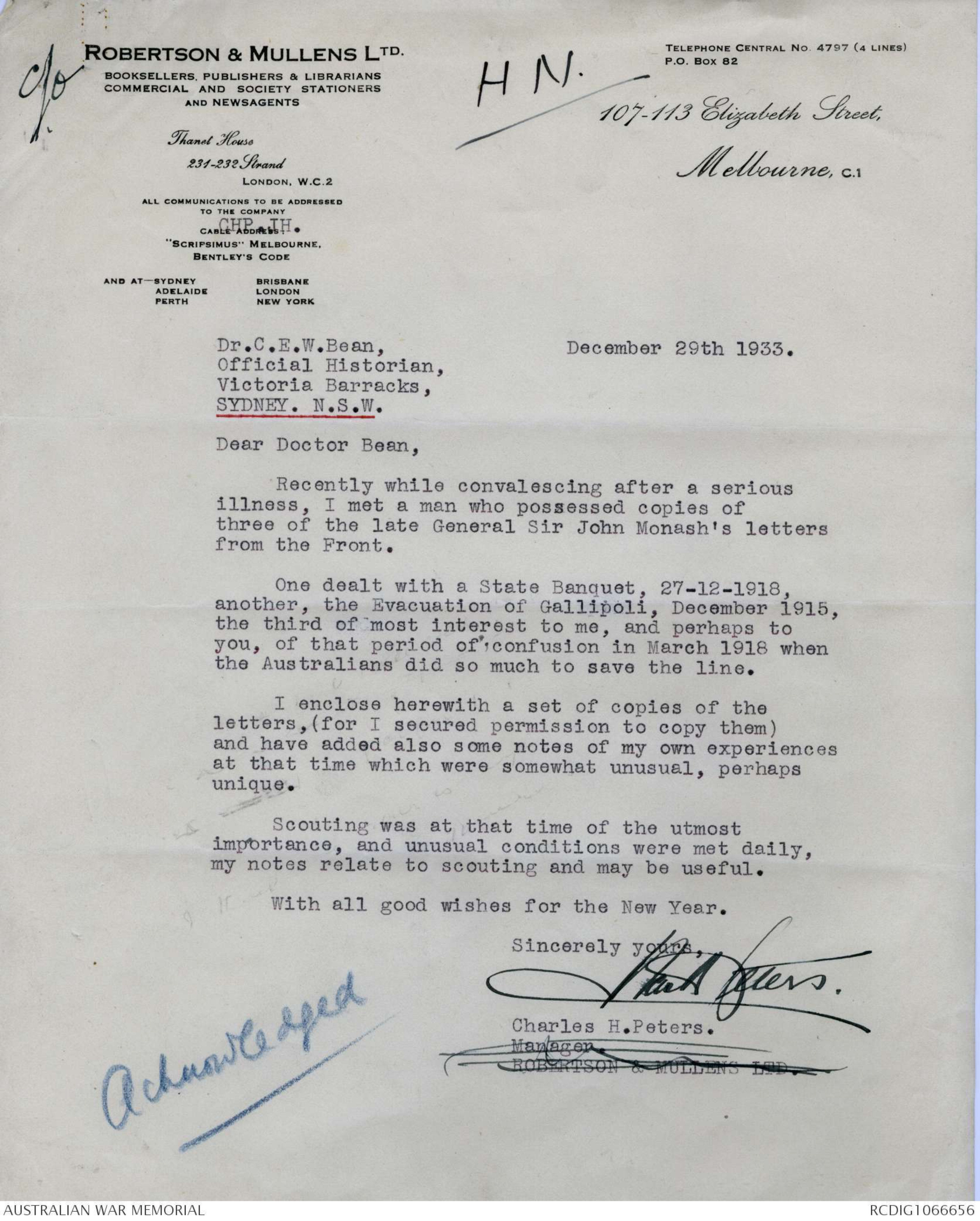
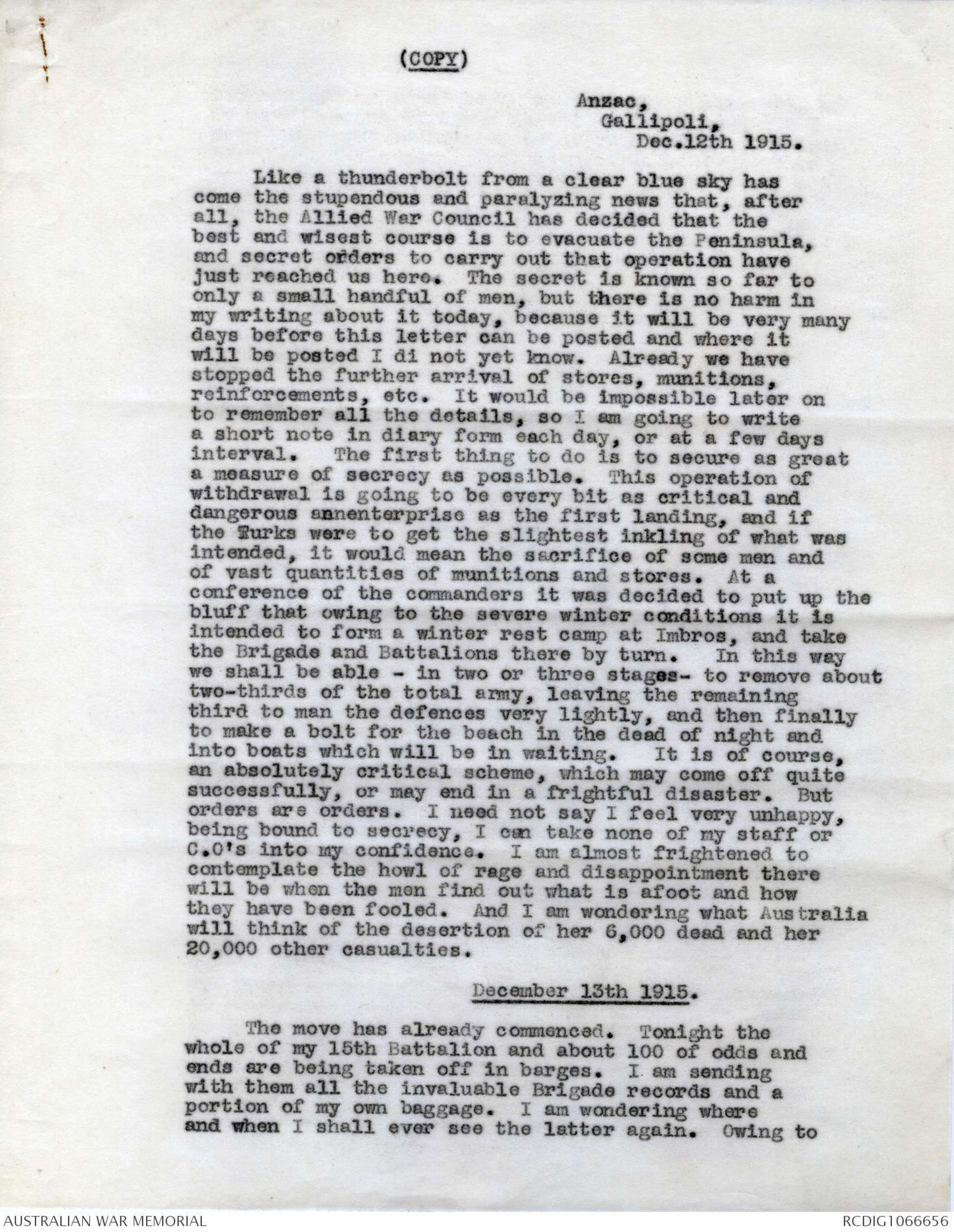
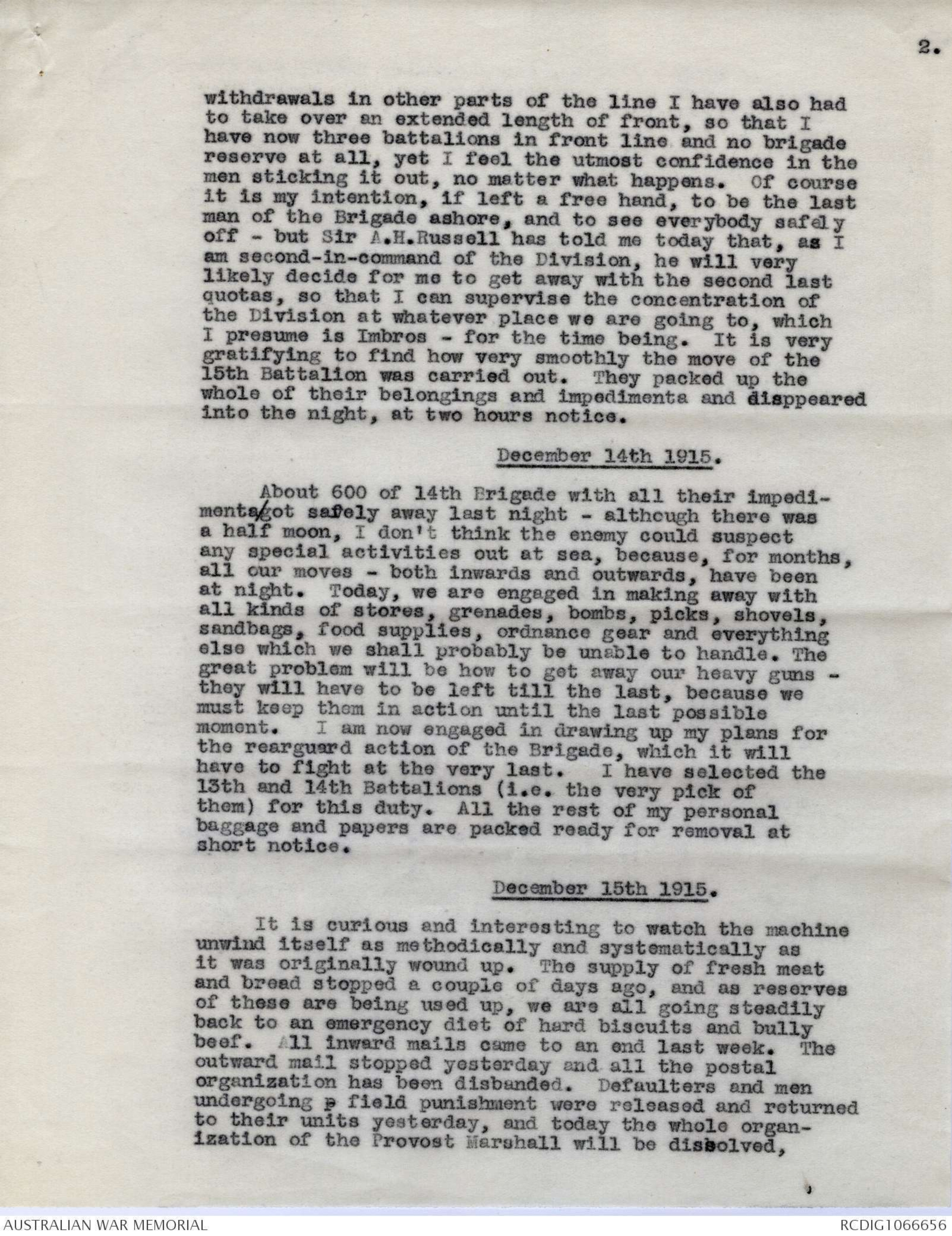
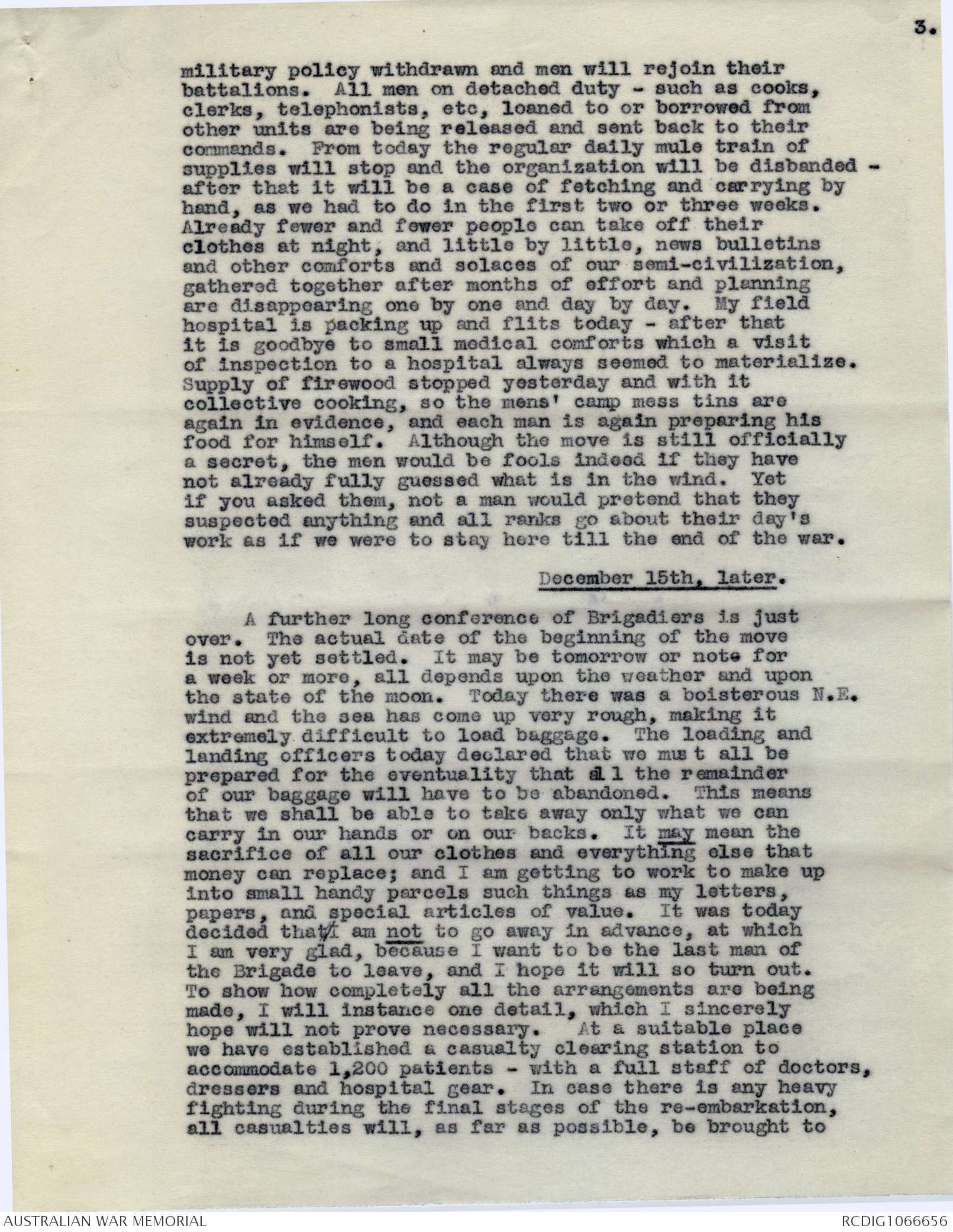
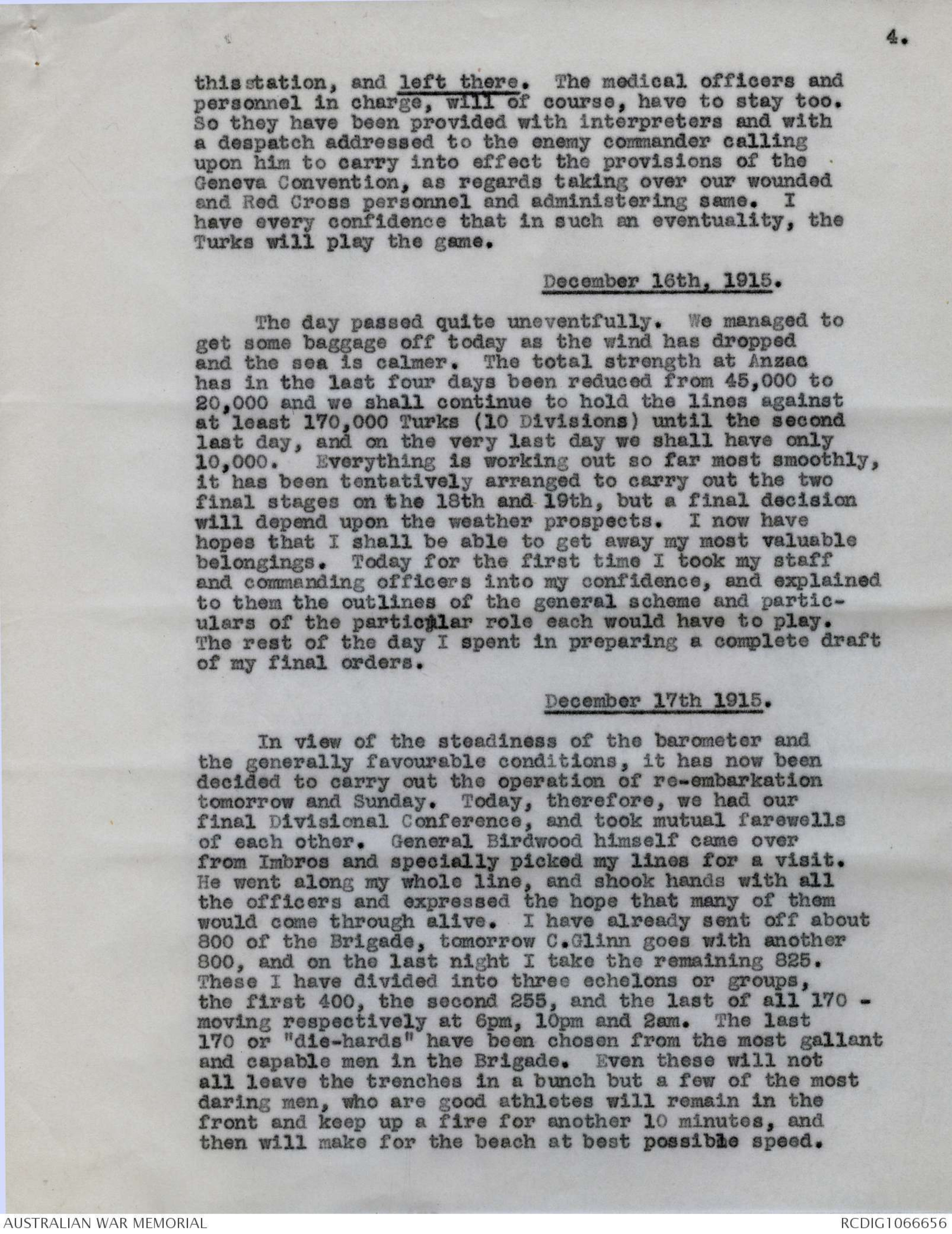
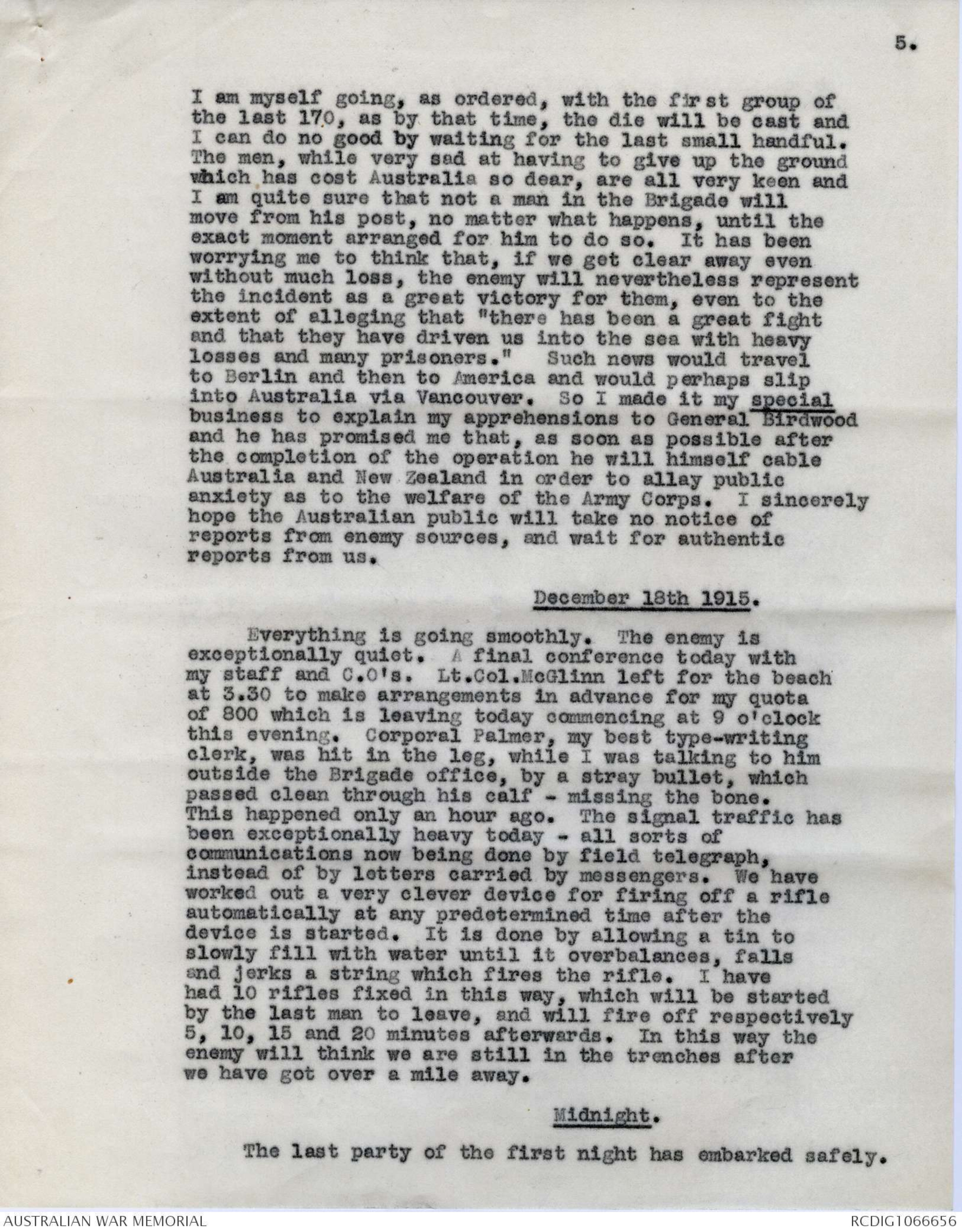
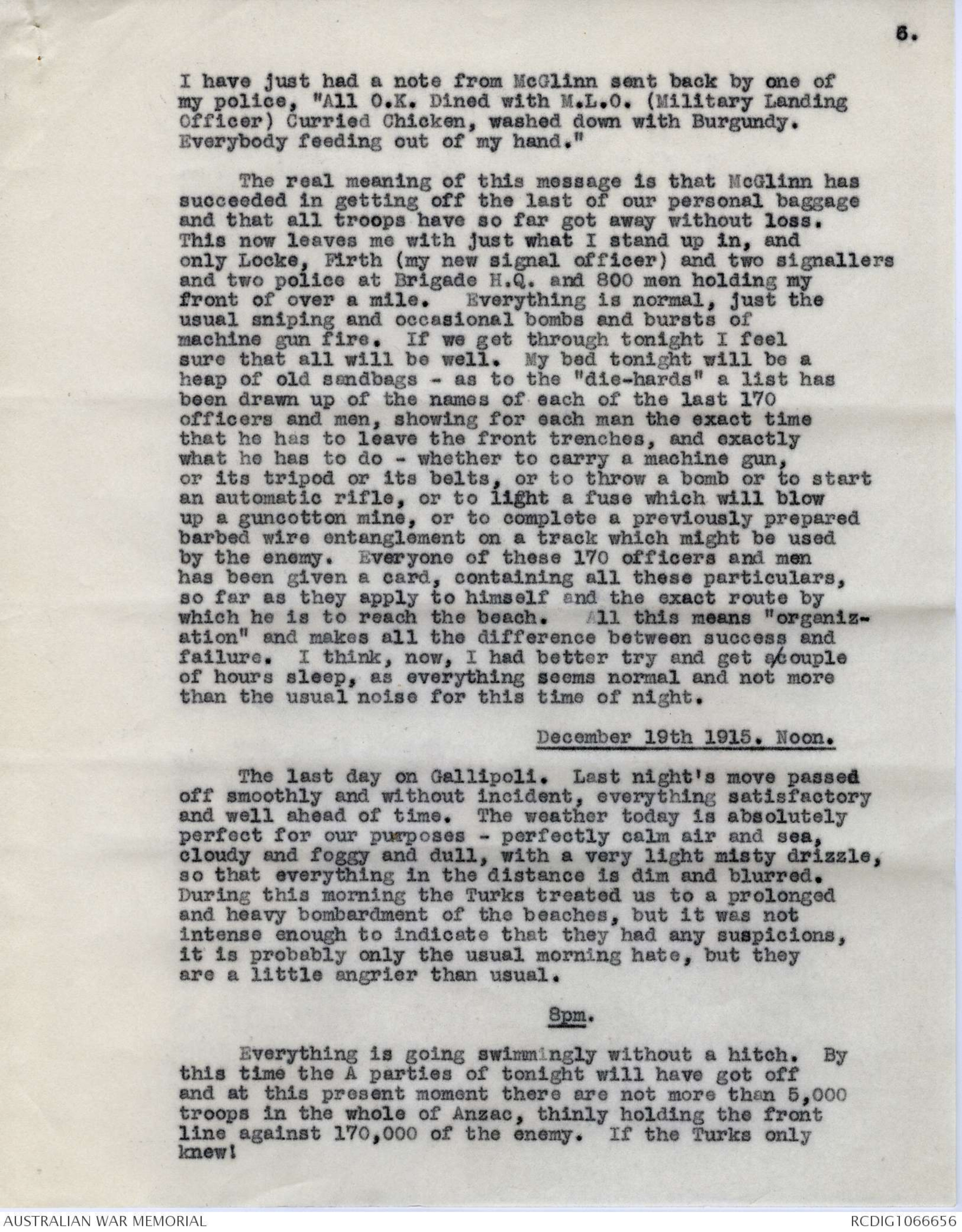
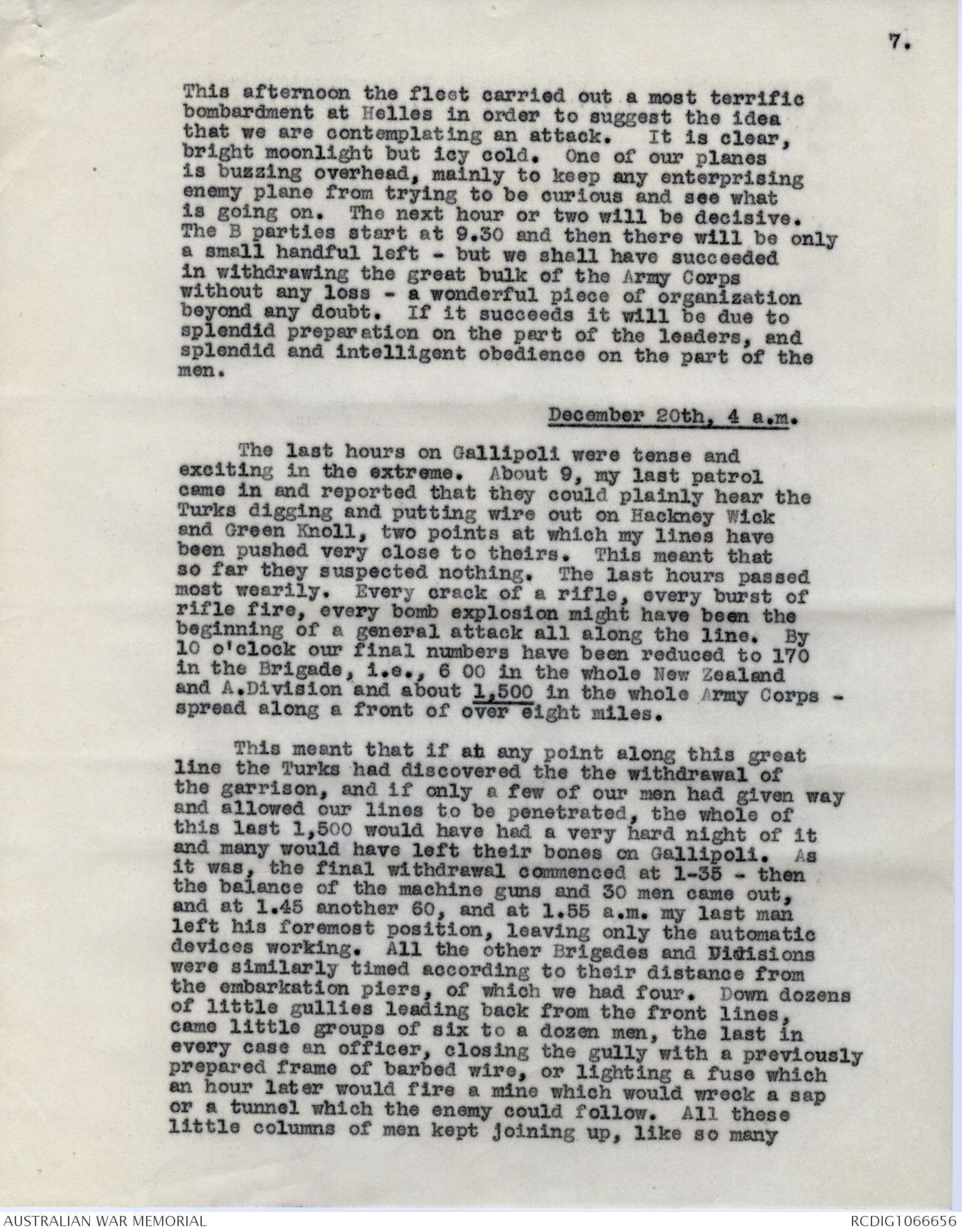
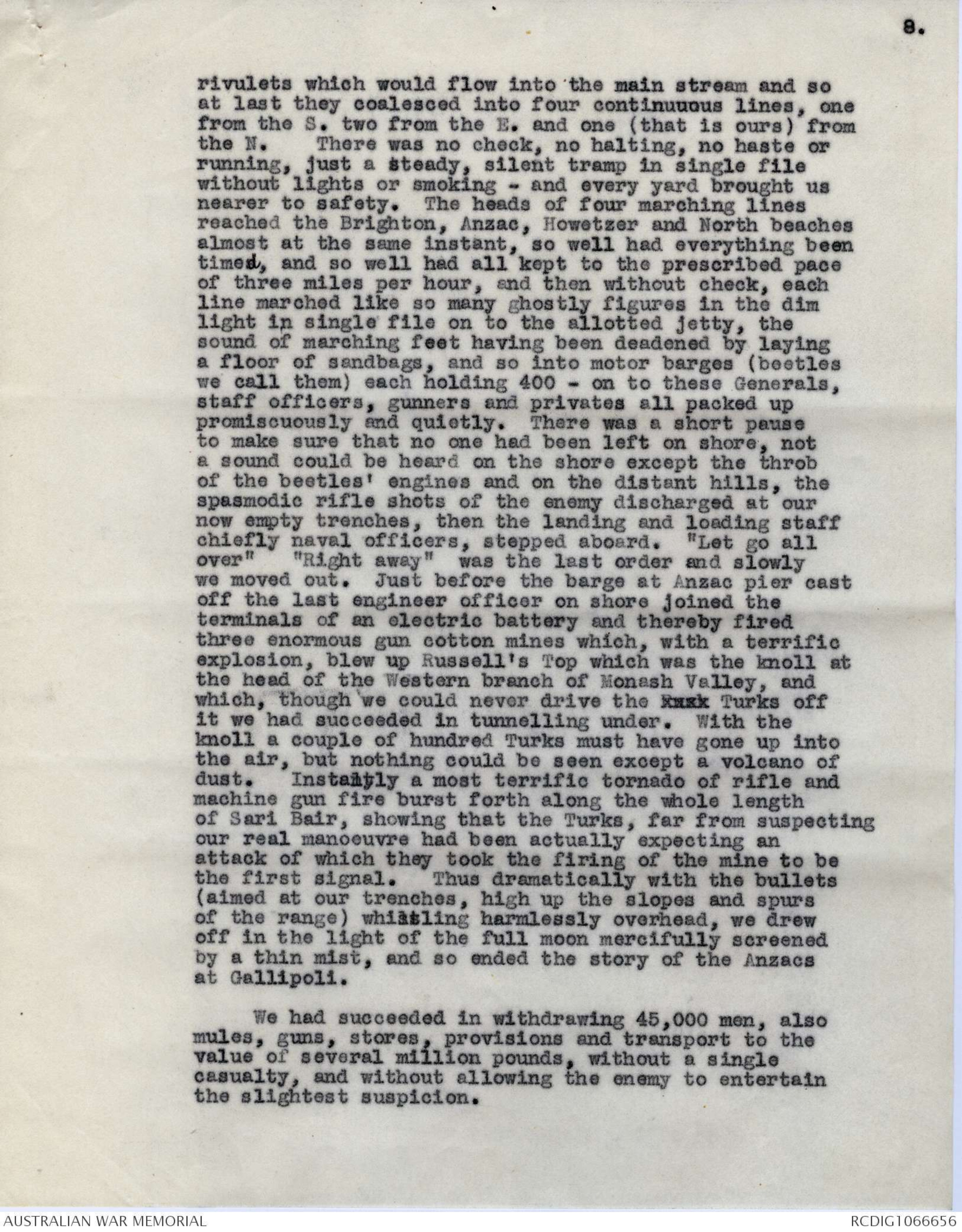
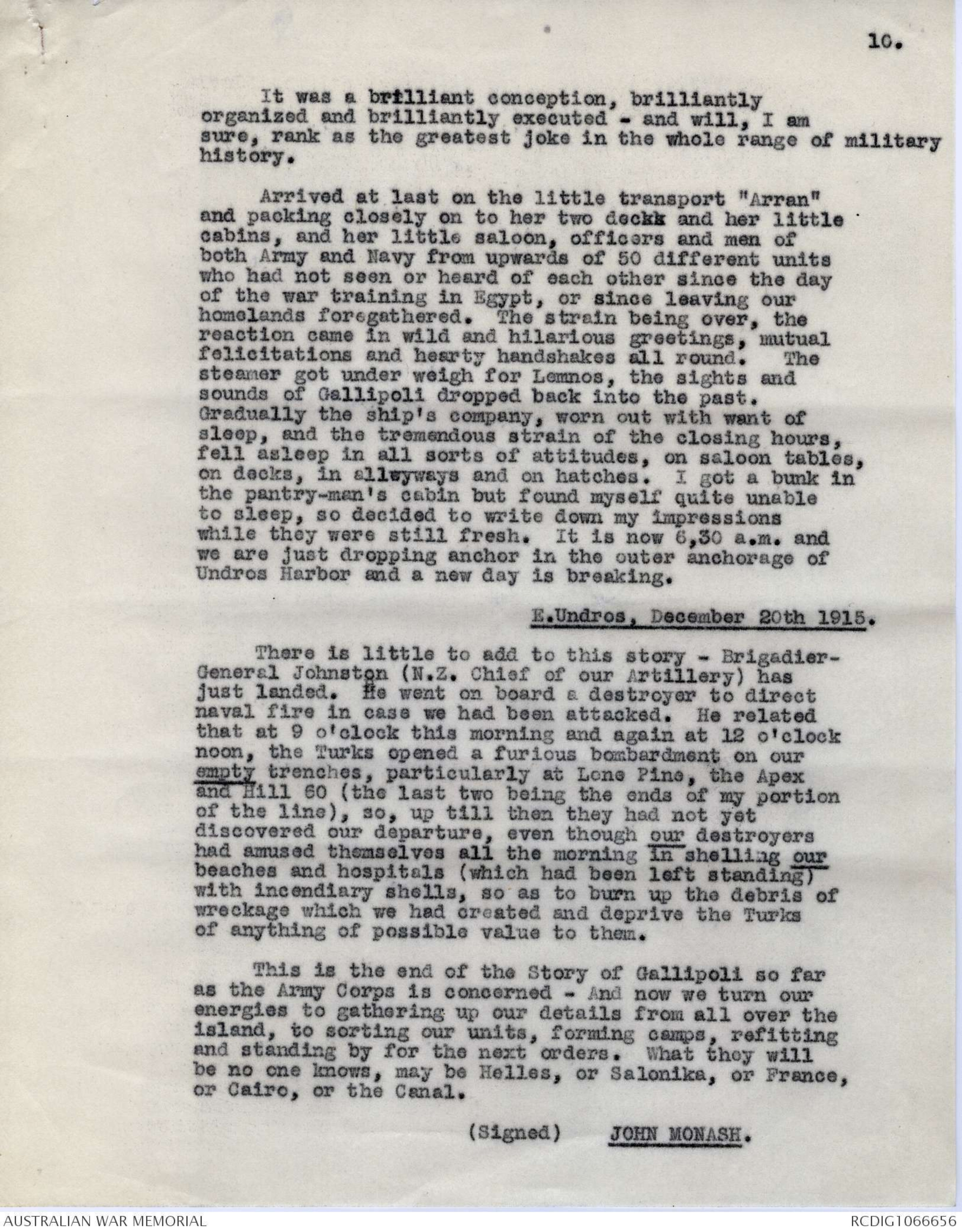
HN.
TELEPHONE CENTRAL NO. 4797 (4 LINES)
P.O. BOX 82
C/O ROBERTSON & MULLENS LTD.
BOOKSELLERS, PUBLISHERS & LIBRARIANS
COMMERCIAL AND SOCIETY STATIONERS
AND NEWSAGENTS
107-113 Elizabeth Street,
Melbourne, C.1
Thanet House
231-232 Strand
LONDON, W.C.2
ALL COMMUNICATIONS TO BE ADDRESSED
TO THE COMPANY
CHP IH.
CABLE ADDRESS
"SCRIPSIMUS" MELBOURNE.
BENTLEY'S CODE
AND AT—SYDNEY BRISBANE
ADELAIDE LONDON
PERTH NEW YORK
Dr.C.E.W.Bean, December 29th 1933.
Official Historian,
Victoria Barracks,
SYDNEY. N.S.W.
Dear Doctor Bean,
Recently while convalescing after a serious
illness, I met a man who possessed copies of
three of the late General Sir John Monash's letters
from the Front.
One dealt with a State Banquet 27-12-1918,
another, the Evacuation of Gallipoli, December 1915,
the third of most interest to me, and perhaps to
you, of that period of confusion in March 1918 when
the Australians did so much to save the line.
I enclose herewith a set of copies of the
letters, (for I secured permission to copy them)
and have added also some notes of my own experiences
at that time which were somewhat unusual, perhaps
unique.
Scouting was at that time of the utmost
importance, and unusual conditions were met daily,
my notes relate to scouting and may be useful.
With all good wishes for the New Year.
Sincerely yours,
Charles Peters.
Charles H.Peters.
Manager
ROBERTSON & MULLENS LTD.
Acknowledged
(COPY)
Anzac,
Gallipoli,
Dec.12th 1915.
Like a thunderbolt from a clear blue sky has
come the stupendous and paralyzing news that, after
all, the Allied War Council has decided that the
best and wisest course is to evacuate the Peninsula,
and secret orders to carry out that operation have
just reached us here. The secret is known so far to
only a small handful of men, but there is no harm in
my writing about it today, because it will be very many
days before this letter can be posted and where it
will be posted I di not yet know. Already we have
stopped the further arrival of stores, munitions
reinforcements, etc. It would be impossible later on
to remember all the details, so I am going to write
a short note in diary form each day, or at a few days
interval. The first thing to do is to secure as great
a measure of secrecy as possible. This operation of
withdrawal is going to be every bit as critical and
dangerous annenterprise as the first landing, and if
the Turks were to get the slightest inkling of what was
intended, it would mean the sacrifice of some men and
of vast quantities of munitions and stores. At a
conference of the commanders it was decided to put up the
bluff that owing to the severe winter conditions it is
intended to form a winter rest camp at Imbros, and take
the Brigade and Battalions there by turn. In this way
we shall be able - in two or three stages- to remove about
two-thirds of the total army, leaving the remaining
third to man the defences very lightly, and then finally
to make a bolt for the beach in the dead of night and
into boats which will be in waiting. It is of course,
an absolutely critical scheme, which may come off quite
successfully, or may end in a frightful disaster. But
orders are orders. I need not say I feel very unhappy,
being bound to secrecy, I can take none of my staff or
C.O's into my confidence. I am almost frightened to
contemplate the howl of rage and disappointment there
will be when the men find out what is afoot and how
they have been fooled. And I am wondering what Australia
will think of the desertion of her 6,000 dead and her
20,000 other casualties.
December 13th 1915.
The move has already commenced. Tonight the
whole of my l5th Battalion and about 100 of odds and
ends are being taken off in barges. I am sending
with them all the invaluable Brigade records and a
portion of my own baggage. I am wondering where
and when I shall ever see the latter again. Owing to
2.
withdrawals in other parts of the line I have also had
to take over an extended length of front, so that I
have now three battalions in front line and no brigade
reserve at all, yet I feel the utmost confidence in the
men sticking it out, no matter what happens. Of course
it is my intention, if left a free hand, to be the last
man of the Brigade ashore, and to see everybody safely
off - but Sir A.H.Russell has told me today that, as I
am second-in-command of the Division, he will very
likely decide for me to get away with the second last
quotas, so that I can supervise the concentration of
the Division at whatever place we are going to, which
I presume is Imbros - for the time being. It is very
gratifying to find how very smoothly the move of the
15th Battalion was carried out. They packed up the
whole of their belongings and impedimenta and disppeared
into the night, at two hours notice.
December 14th 1915.
About 600 of 14th Brigade with all their impediments
got safely away last night - although there was
a half moon, I don't think the enemy could suspect
any special activities out at sea, because, for months,
all our moves - both inwards and outwards, have been
at night. Today, we are engaged in making away with
all kinds of stores, grenades, bombs, picks, shovels,
sandbags, food supplies, ordnance gear and everything
else which we shall probably be unable to handle. The
great problem will be how to get away our heavy guns -
they will have to be left till the last, because we
must keep them in action until the last possible
moment. I am now engaged in drawing up my plans for
the rearguard action of the Brigade, which it will
have to fight at the very last. I have selected the
13th and 14th Battalions (i.e. the very pick of
them) for this duty. All the rest of my personal
baggage and papers are packed ready for removal at
short notice.
December 15th 1915.
It is curious and interesting to watch the machine
unwind itself as methodically and systematically as
it was originally wound up. The supply of fresh meat
and bread stopped a couple of days ago, and as reserves
of these are being used up, we are all going steadily
back to an emergency diet of hard biscuits and bully
beef. All inward mails came to an end last week. The
outward mail stopped yesterday and all the postal
organization has been disbanded. Defaulters and men
undergoing p field punishment were released and returned
to their units yesterday, and today the whole organization
of the Provost Marshall will be dissolved,
3.
military policy withdrawn and men will rejoin their
battalions. All men on detached duty - such as cooks,
clerks, telephonists, etc, loaned to or borrowed from
other units are being released and sent back to their
commands. From today the regular daily mule train of
supplies will stop and the organization will be disbanded
after that it will be a case of fetching and carrying by
hand, as we had to do in the first two or three weeks.
Already fewer and fewer people can take off their
clothes at night, and little by little, news bulletins
and other comforts and solaces of our semi-civilization,
gathered together after months of effort and planning
are disappearing one by one and day by day. My field
hospital is packing up and flits today - after that
it is goodbye to small medical comforts which a visit
of inspection to a hospital always seemed to materialize.
Supply of firewood stopped yesterday and with it
collective cooking, so the mens' camp mess tins are
again in evidence, and each man is again preparing his
food for himself. Although the move is still officially
a secret, the men would be fools indeed if they have
not already fully guessed what is in the wind. Yet
if you asked them, not a man would pretend that they
suspected anything and all ranks go about their day's
work as if we were to stay here till the end of the war.
December 15th, later.
A further long conference of Brigadiers is just
over. The actual date of the beginning of the move
is not yet settled. It may be tomorrow or note for
a week or more, all depends upon the weather and upon
the state of the moon. Today there was a boisterous N.E.
wind and the sea has come up very rough, making it
extremely difficult to load baggage. The loading and
landing officers today declared that we must all be
prepared for the eventuality that all the remainder
of our baggage will have to be abandoned. This means
that we shall be able to take away only what we can
carry in our hands or on our backs. It may mean the
sacrifice of all our clothes and everything else that
money can replace; and I am getting to work to make up
into small handy parcels such things as my letters,
papers, and special articles of value. It was today
decided that I am not to go away in advance, at which
I am very glad, because I want to be the last man of
the Brigade to leave, and I hope it will so turn out.
To show how completely all the arrangements are being
made, I will instance one detail, which I sincerely
hope will not prove necessary. At a suitable place
we have established a casualty clearing station to
accommodate 1,200 patients - with a full staff of doctors,
dressers and hospital gear. In case there is any heavy
fighting during the final stages of the re-embarkation,
all casualties will, as far as possible, be brought to
4.
this station, and left there. The medical officers and
personnel in charge, will of course, have to stay too.
So they have been provided with interpreters and with
a despatch addressed to the enemy commander calling
upon him to carry into effect the provisions of the
Geneva Convention, as regards taking over our wounded
and Red Cross personnel and administering same. I
have every confidence that in such an eventuality, the
Turks will play the game.
December 16th, 1915.
The day passed quite uneventfully. We managed to
get some baggage off today as the wind has dropped
and the sea is calmer. The total strength at Anzac
has in the last four days been reduced from 45,000 to
20,000 and we shall continue to hold the lines against
at least 170,000 Turks (10 Divisions) until the second
last day, and on the very last day we shall have only
10,000. Everything is working out so far most smoothly,
it has been tentatively arranged to carry out the two
final stages on the 18th and 19th, but a final decision
will depend upon the weather prospects. I now have
hopes that I shall be able to get away my most valuable
belongings. Today for the first time I took my staff
and commanding officers into my confidence, and explained
to them the outlines of the general scheme and particulars
of the particular role each would have to play.
The rest of the day I spent in preparing a complete draft
of my final orders.
December 17th 1915
In view of the steadiness of the barometer and
the generally favourable conditions, it has now been
decided to carry out the operation of re-embarkation
tomorrow and Sunday. Today, therefore, we had our
final Divisional Conference, and took mutual farewells
of each other. General Birdwood himself came over
from Imbros and specially picked my lines for a visit.
He went along my whole line, and shook hands with all
the officers and expressed the hope that many of them
would come through alive. I have already sent off about
800 of the Brigade, tomorrow C.Glinn goes with another
800, and on the last night I take the remaining 825.
These I have divided into three echelons or groups,
the first 400, the second 255, and the last of all 170 -
moving respectively at 6pm, 10pm and 2am. The last
170 or "die-hards" have been chosen from the most gallant
and capable men in the Brigade. Even these will not
all leave the trenches in a bunch but a few of the most
daring men, who are good athletes will remain in the
front and keep up a fire for another 10 minutes, and
then will make for the beach at best possible speed.
5.
I am myself going, as ordered, with the first group of
the last 170, as by that time, the die will be cast and
I can do no good by waiting for the last small handful.
The men, while very sad at having to give up the ground
which has cost Australia so dear, are all very keen and
I am quite sure that not a man in the Brigade will
move from his post, no matter what happens, until the
exact moment arranged for him to do so. It has been
worrying me to think that, if we get clear away even
without much loss, the enemy will nevertheless represent
the incident as a great victory for them, even to the
extent of alleging that "there has been a great fight
and that they have driven us into the sea with heavy
losses and many prisoners." Such news would travel
to Berlin and then to America and would perhaps slip
into Australia via Vancouver. So I made it my special
business to explain my apprehensions to General Birdwood
and he has promised me that, as soon as possible after
the completion of the operation he will himself cable
Australia and New Zealand in order to allay public
anxiety as to the welfare of the Army Corps. I sincerely
hope the Australian public will take no notice of
reports from enemy sources, and wait for authentic
reports from us.
December 18th 1915.
Everything is going smoothly. The enemy is
exceptionally quiet. A final conference today with
my staff and C.O's. Lt.Col.McGlinn left for the beach
at 3.30 to make arrangements in advance for my quota
of 800 which is leaving today commencing at 9 o'clock
this evening. Corporal Palmer, my best type-writing
clerk, was hit in the leg, while I was talking to him
outside the Brigade office, by a stray bullet, which
passed clean through his calf - missing the bone.
This happened only an hour ago. The signal traffic has
been exceptionally heavy today - all sorts of
communications now being done by field telegraph,
instead of by letters carried by messengers. We have
worked out a very clever device for firing off a rifle
automatically at any predetermined time after the
device is started. It is done by allowing a tin to
slowly fill with water until it overbalances, falls
and jerks a string which fires the rifle. I have
had 10 rifles fixed in this way, which will be started
by the last man to leave, and will fire off respectively
5, 10, 15 and 20 minutes afterwards. In this way the
enemy will think we are still in the trenches after
we have got over a mile away.
Midnight.
The last party of the first night has embarked safely.
5.
I have just had a note from McGlinn sent back by one of
my police, "All O.K. Dined with M.L.O. (Military Landing
Officer) Curried Chicken, washed down with Burgundy.
Everybody feeding out of my hand."
The real meaning of this message is that McGlinn has
succeeded in getting off the last of our personal baggage
and that all troops have so far got away without loss.
This now leaves me with just what I stand up in, and
only Locke, Firth (my new signal officer) and two signallers
and two police at Brigade H.Q. and 800 men holding my
front of over a mile. Everything is normal, just the
usual sniping and occasional bombs and bursts of
machine gun fire. If we get through tonight I feel
sure that all will be well. My bed tonight will be a
heap of old sandbags - as to the "die-hards" a list has
been drawn up of the names of each of the last 170
officers and men, showing for each man the exact time
that he has to leave the front trenches, and exactly
what he has to do - whether to carry a machine gun
or its tripod or its belts, or to throw a bomb or to start
an automatic rifle, or to light a fuse which will blow
up a guncotton mine, or to complete a previously prepared
barbed wire entanglement on a track which might be used
by the enemy. Everyone of these 170 officers and men
has been given a card, containing all these particulars,
so far as they apply to himself and the exact route by
which he is to reach the beach. All this means "organization"
and makes all the difference between success and
failure. I think, now, I had better try and get a couple
of hours sleep, as everything seems normal and not more
than the usual noise for this time of night.
December 19th 1915. Noon.
The last day on Gallipoli. Last night's move passed
off smoothly and without incident, everything satisfactory
and well ahead of time. The weather today is absolutely
perfect for our purposes - perfectly calm air and sea
cloudy and foggy and dull, with a very light misty drizzle
so that everything in the distance is dim and blurred.
During this morning the Turks treated us to a prolonged
and heavy bombardment of the beaches, but it was not
intense enough to indicate that they had any suspicions,
it is probably only the usual morning hate, but they
are a little angrier than usual.
8pm.
Everything is going swimmingly without a hitch. By
this time the A parties of tonight will have got off
and at this present moment there are not more than 5,000
troops in the whole of Anzac, thinly holding the front
line against 170,000 of the enemy. If the Turks only
knew!
7.
This afternoon the fleet carried out a most terrific
bombardment at Helles in order to suggest the idea
that we are contemplating an attack. It is clear,
bright moonlight but icy cold. One of our planes
is buzzing overhead, mainly to keep any enterprising
enemy plane from trying to be curious and see what
is going on. The next hour or two will be decisive,
The B parties start at 9.30 and then there will be only
a small handful left - but we shall have succeeded
in withdrawing the great bulk of the Army Corps
without any loss - a wonderful piece of organization
beyond any doubt. If it succeeds it will be due to
splendid preparation on the part of the leaders, and
splendid and intelligent obedience on the part of the
men.
December 20th, 4 a.m.
The last hours on Gallipoli were tense and
exciting in the extreme. About 9, my last patrol
came in and reported that they could plainly hear the
Turks digging and putting wire out on Hackney Wick
and Green Knoll, two points at which my lines have
been pushed very close to theirs. This meant that
so far they suspected nothing. The last hours passed
most wearily. Every crack of a rifle, every burst of
rifle fire, every bomb explosion might have been the
beginning of a general attack all along the line. By
10 o'clock our final numbers have been reduced to 170
in the Brigade, i.e., 600 in the whole New Zealand
and A.Division and about 1,500 in the whole Army Corps
spread along a front of over eight miles.
This meant that if an any point along this great
line the Turks had discovered the the withdrawal of
the garrison, and if only a few of our men had given way
and allowed our lines to be penetrated, the whole of
this last 1,500 would have had a very hard night of it
and many would have left their bones on Gallipoli. As
it was, the final withdrawal commenced at 1-35 - then
the balance of the machine guns and 30 men came out,
and at 1.45 another 60, and at 1.55 a.m. my last man
left his foremost position, leaving only the automatic
devices working. All the other Brigades and Divisions
were similarly timed according to their distance from
the embarkation piers, of which we had four. Down dozens
of little gullies leading back from the front lines
came little groups of six to a dozen men, the last in
every case an officer, closing the gully with a previously
prepared frame of barbed wire, or lighting a fuse which
an hour later would fire a mine which would wreck a sap
or a tunnel which the enemy could follow. All these
little columns of men kept joining up, like so many
8.
rivulets which would flow into the main stream and so
at last they coalesced into four continuuous lines, one
from the S. two from the E. and one (that is ours) from
the N. There was no check, no halting, no haste or
running, just a steady, silent tramp in single file
without lights or smoking - and every yard brought us
nearer to safety. The heads of four marching lines
reached the Brighton, Anzac, Howetzer and North beaches
almost at the same instant, so well had everything been
timed, and so well had all kept to the prescribed pace
of three miles per hour, and then without check, each
line marched like so many ghostly figures in the dim
light in single file on to the allotted jetty, the
sound of marching feet having been deadened by laying
a floor of sandbags, and so into motor barges (beetles
we call them) each holding 400 - on to these Generals,
staff officers, gunners and privates all packed up
promiscuously and quietly. There was a short pause
to make sure that no one had been left on shore, not
a sound could be heard on the shore except the throb
of the beetles' engines and on the distant hills, the
spasmodic rifle shots of the enemy discharged at our
now empty trenches, then the landing and loading staff
chiefly naval officers, stepped aboard. "Let go all
over" "Right away" was the last order and slowly
we moved out. Just before the barge at Anzac pier cast
off the last engineer officer on shore joined the
terminals of an electric battery and thereby fired
three enormous gun cotton mines which, with a terrific
explosion, blew up Russell's Top which was the knoll at
the head of the Western branch of Monash Valley, and
which, though we could never drive the Txxk Turks off
it we had succeeded in tunnelling under. With the
knoll a couple of hundred Turks must have gone up into
the air, but nothing could be seen except a volcano of
dust. Instantly a most terrific tornado of rifle and
machine gun fire burst forth along the whole length
of Sari Bair, showing that the Turks, far from suspecting
our real manoeuvre had been actually expecting an
attack of which they took the firing of the mine to be
the first signal. Thus dramatically with the bullets
(aimed at our trenches, high up the slopes and spurs
of the range) whistling harmlessly overhead, we drew
off in the light of the full moon mercifully screened
by a thin mist, and so ended the story of the Anzacs
at Gallipoli.
We had succeeded in withdrawing 45,000 men, also
mules, guns, stores, provisions and transport to the
value of several million pounds, without a single
casualty, and without allowing the enemy to entertain
the slightest suspicion.
10.
It was a brilliant conception, brilliantly
organized and brilliantly executed - and will, I am
sure, rank as the greatest joke in the whole range of military
history.
Arrived at last on the little transport "Arran"
and packing closely on to her two deckk and her little
cabins, and her little saloon, officers and men of
both Army and Navy from upwards of 50 different units
who had not seen or heard of each other since the day
of the war training in Egypt, or since leaving our
homelands foregathered. The strain being over, the
reaction came in wild and hilarious greetings, mutual
felicitations and hearty handshakes all round. The
steamer got under weigh for Lemnos, the sights and
sounds of Gallipoli dropped back into the past
Gradually the ship's company, worn out with want of
sleep, and the tremendous strain of the closing hours
fell asleep in all sorts of attitudes, on saloon tables,
on decks, in alleyways and on hatches. I got a bunk in
the pantry-man's cabin but found myself quite unable
to sleep, so decided to write down my impressions
while they were still fresh. It is now 6,30 a.m. and
we are just dropping anchor in the outer anchorage of
Undros Harbor and a new day is breaking.
E.Undros, December 20th 1915.
There is little to add to this story - Brigadier-General
Johnston (N.Z. Chief of our Artillery) has
just landed. He went on board a destroyer to direct
naval fire in case we had been attacked. He related
that at 9 o'clock this morning and again at 12 o'clock
noon, the Turks opened a furious bombardment on our
empty trenches, particularly at Lone Pine, the Apex
and Hill 60 (the last two being the ends of my portion
of the line), so, up till then they had not yet
discovered our departure, even though our destroyers
had amused themselves all the morning in shelling our
beaches and hospitals (which had been left standing)
with incendiary shells, so as to burn up the debris of
wreckage which we had created and deprive the Turks
of anything of possible value to them.
This is the end of the Story of Gallipoli so far
as the Army Corps is concerned - And now we turn our
energies to gathering up our details from all over the
island, to sorting our units, forming camps, refitting
and standing by for the next orders. What they will
be no one knows, may be Helles, or Salonika, or France,
or Cairo, or the Canal.
(Signed) JOHN MONASH.
 Sue Harris
Sue HarrisThis transcription item is now locked to you for editing. To release the lock either Save your changes or Cancel.
This lock will be automatically released after 60 minutes of inactivity.